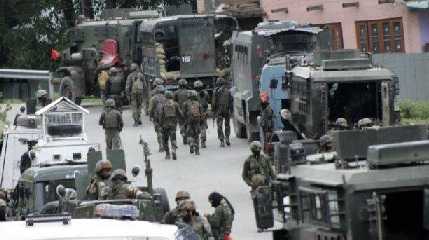
NEW YORK, Sep 26 (APP): Hundreds of Kashmiris from across the U.S. and their supporters Tuesday staged a demonstration in front of the U.N. building to renew their call on the world body to implement its pledge for the exercise of their right of self-determination, as India’s External Affairs Minister, S. Jaishankar, addressed the General Assembly.
Led by prominent Kashmiri leaders, including Ghulam Nabi Fai, Ghulam Nabi Mir and Sardar Sarwar Khan, they denounced India’s “illegal” measures of 5 August 2019 that revoked the special status of Jammu and Kashmir, amid vociferous anti-India slogans and waving of placards.
Their placards read: “India: Honour UN Resolutions”, “Freedom for all, Freedom for Kashmir”, “Indian Forces: Out of Kashmir”, “Demilitarize Kashmir”, “UN: Wake UP”, “No Justice, No Peace”, “We Demand Justice for Yasin Malik”; “India: Release All Political Prisoners.”
Separately, a large number of Sikhs, led by Dr. Amarjit Singh, the head of Washington-based Khalistan Affairs Center,
also staged a demonstration, which came days after Canada’s allegation about India’s involvement in the murder Sikh leader Hardeep Singh Niggar on Canadian soil.
Speakers at Kashmiris’ rally condemned the Indian government’s attempts at changing the demographic status of Jammu & Kashmir by introducing politically motivated laws. They also called for the release of Kashmiri leaders,
including Muhammad Yasin Malik, one of the most prominent leaders of Kashmir, and Chairman of the Jammu Kashmir Liberation Front (JKLF).
A memorandum, signed by 11 Kashmiri leaders, was submitted to UN Secretary-General Antonio Guterres, saying that the denial of the right to self-determination to the people of Jammu and Kashmir is a great threat to international peace and security.
“Nonresolution of Kashmir dispute has brought both India and Pakistan to the brink of nuclear catastrophe,”
the memorandum said.
It also said that Kashmir is the only region in the world which shares its borders with three nuclear countries – India, Pakistan, and China.
“As you know very well that India is fighting with China on one side, and with Pakistan on the other. That makes Kashmir the most dangerous place on earth, the memorandum said.
It added, “Jammu & Kashmir is now undergoing a rapid transition from illegal occupation into an Indian settler-colonialist and apartheid project. Since August 5, 2019, Indian-occupied Kashmir is facing an existential threat and the inaction of world powers will facilitate the execution of this evil design.
“Everyday killings, molestation of women, stealing of valuables by occupation forces are continuing with impunity. A genocidal and ethnic cleansing plan is in place. Under the new Domicile Law, 4.2 million Indian Hindus have been issued domicile certificates. Floodgates to demographically dilute the Muslim majority population into a minority have been opened.
“There is a deep conspiracy to erase the most treasured tradition of Kashmiri Muslim creed, culture, and legacy. This atrocity is starting to run deeper and deeper under the Modi regime. It is what amounts to crimes against humanity. Even in the academic space, our history books, or any reference to Kashmir’s struggle for self-determination are being removed,”
“It is beyond doubt that the longer the uncertainties continue and the longer the United Nations and world powers ignore Jammu & Kashmir, the more dangerous and intractable the crisis becomes. The crisis requires immediate diplomacy that recognizes the explosive situation on the ground in Jammu and Kashmir and takes immediate measures to avert it before it explodes.
“We hope that your Excellency will persuade Government of India to rescind the Domicile Law which is designed to change the demography of Kashmir; and to prevail upon India to repeal all draconian laws, including Unlawful Activity Prevention Act (UAPA), Public Safety Act (PSA) which are being used to forcibly silence the people into submission.”
The memorandum was signed by Dr. Ghulam Nabi Fai, Dr. Ghulam Nabi Mir, Sardar Sawar Khan, Sardar Haleem Khan, Sardar Zarif Khan, Sardar Taj Khan, Raja Razzak , Imtiaz Khan Garalvi, Sardar Zufiqar Roshan Khan, Raja Mukhtar and Sardar Zubair Khan.




